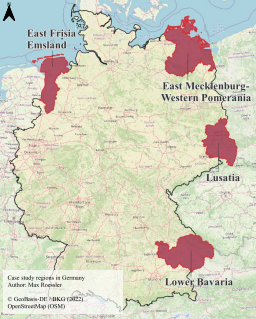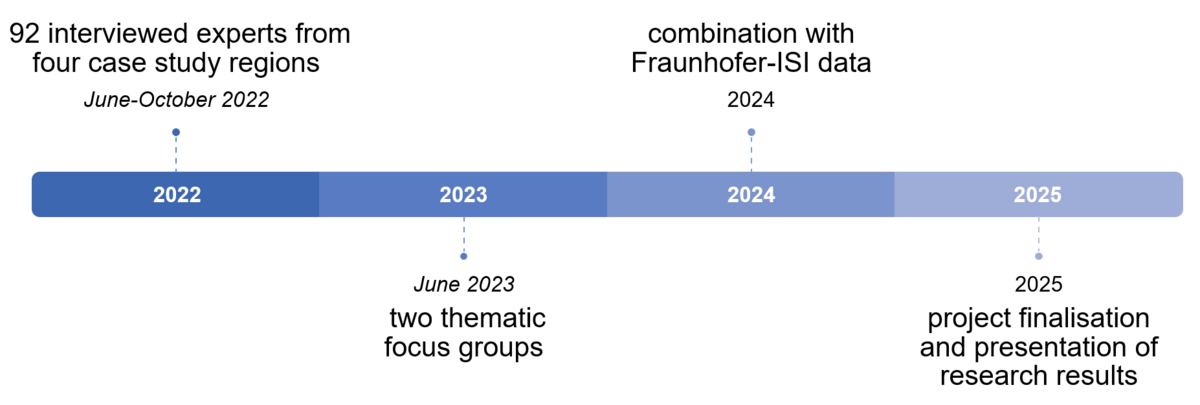Die Bedeutung von Change Agency für Innovation und Transformation in relational-peripheren Regionen
Den inhaltlichen Ausgangspunkt dieses Forschungsvorhabens bildet die Tatsache, dass sich zurzeit zahlreiche Mechanismen der Entstehung von Innovationen und damit der Genese wissensbasierter Entwicklungspfade dynamisch verändern. Ursächlich hierfür sind vor allem Entwicklungen im Bereich der Digitalisierung sowie eine allgemeine Nachhaltigkeitsorientierung. Daraus ergeben sich nicht nur für wirtschaftliche Zentren, sondern auch für strukturschwache Räume, neue, bisher unzureichend erforschte Konsequenzen.
Das Forschungsprojekt hat vor diesem Hintergrund das Ziel, die Auswirkungen der neuen Dynamiken wirtschaftlich-gesellschaftlichen Wandels auf regionale Transformationsprozesse sowie der sich in diesem Zusammenhang ergebenden Handlungsoptionen bei der Etablierung wissensbasierter Entwicklungspfade, zu erklären und zu bewerten. Der räumliche Fokus des Vorhabens liegt dabei, entgegen der Mehrzahl bislang vorliegender Untersuchungen, bewusst auf in Innovationsnetzwerken peripher verorteten Räumen, für welche die Implikationen neuer, übergreifender Dynamiken bisher unzureichend untersucht sind. Zur konzeptionellen sowie empirischen Erfassung entsprechender Entwicklungen sind hierbei insbesondere durch das Agency-Konzept motivierte Ansätze relevant, da mittels klassischer, auf Ressourcenausstattung beruhenden Ansätzen im Bereich strukturschwächerer Regionen mit geringem Industriebesatz kaum differenzierte Erkenntnisse zu erzielen sind.
Der Hauptfokus der Forschung liegt demnach auf der Entwicklung eines besseren Verständnisses der raumbezogenen Aspekte von innovationsbasierten Transformationsprozessen. Um dieses Ziel zu erreichen, werden im Teilprojekt an der Universität Greifswald bestehende Möglichkeitsräume in ausgewählten Fallstudienregionen erfasst sowie regionale Agenten des Wandels identifiziert und eine qualitative Netzwerkanalyse zur systematischen Erfassung regionaler Akteurskonstellationen durchgeführt. Zusammen mit einer datengetriebenen Analyse werden so regionalwirtschaftlich relevante Experten für anschließende Experteninterviews identifiziert. Dies stellt den methodischen Ausgangspunkt für eine interpretative Analyse der regionalen Pfadentwicklung dar, welche die Grundlage zur abschließenden Synthese der überwiegend qualitativ gewonnenen Erkenntnisse mit den quantitativen Forschungsergebnissen der Projektpartner am Fraunhofer-Institut für System- und Innovationsforschung ISI bilden.


The significance of change agency for innovation and transformation in relationally peripheral regions
This research project departs from the acknowledgement that numerous mechanisms of innovations and with that the genesis of knowledge-based development paths are in a process of changing dynamically. The reasons for this are above all developments in the area of digitalization as well as new requirements resulting from decarbonisation targets. These result in new up to now insufficiently researched implications not only for economic centres but also for structurally weak areas.
Against this background, the project combines two current debates, both of which support the notion that, conceptually, a spatially differentiated analysis of knowledge-based development paths would be increasingly necessary. In practice, however, it seems far from sufficiently implemented.
Geographical innovation research on the development of industrial paths, for example, in principle recognizes the role of less developed regions. In practice, however, most studies remain focussed on technologically leading centres. In parallel, research on socio-technical transitions articulates the ambition of elaborating on the spatial dimension of actor networks and transformation in more detail, which - in a similar - remains far from fully achieved.
Conceptually, this project will build on approaches motivated by the agency concept are particularly relevant and suitable to empirically capture corresponding developments. Building on recent advances in the conceptual literature, we will seek to develop and operationalise empirical strategies that are more suitable for the study of less developed regions than established approaches based on resource endowments as documented in official statistics and databases.
A first aim of the proposed research project is to clarify and assess the impact of new dynamics of the economic and societal change on regional transformation processes. Secondly, it aims to identify options for actions arising in this context when establishing knowledge-based development paths. In doing so, the focus of the research project is deliberately put on innovation networks in peripheral spaces. For this area the implications of emerging socio-technical dynamics remain insufficiently researched.


